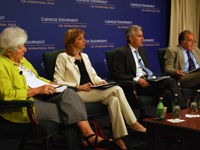Registration
You will receive an email confirming your registration.
IMGXYZ3133IMGZYXTo gain the popular legitimacy needed for a sustained political transition, Egypt’s government will need to show measurable economic progress. What happens in Egypt is pivotal in determining the course of the rest of the region.
Carnegie’s Uri Dadush and Marina Ottaway and the Atlantic Council’s Michele Dunne discussed Egypt’s current economic situation and how the international community can best help Egypt’s economy grow. Jeffrey Gedmin, CEO of the Legatum Institute, moderated.
The Economic Story of a Political Revolution
Dadush highlighted four key points regarding how the Egyptian economy is tied to the country’s political transition.
- Strong Fundamentals: Dadush argued that the long-term dynamics that form the foundation of the Egyptian economy are positive. The economic data suggests that Egypt had a rapidly growing and diversified economy that weathered the recent financial crisis, with relatively manageable levels of income inequality. Although Egypt must overcome a large public debt and high unemployment, its economy is likely to continue to grow rapidly if it is stabilized and progress on market reforms is maintained.
- Short-Term Funds: Egypt does not need a large infusion of short-term money, Dadush said. In fact, the transitional council recently turned down loan offers from the International Monetary Fund and the World Bank. At this point, Dadush suggested that flooding the Egyptian economy with money in the short term without any conditions on its use could actually be counterproductive.
- Interim Government: The fact that Egypt is currently ruled by an interim government, which lacks the legitimacy to undertake long-term reforms or establish a strategic economic vision, means that the country is likely to demonstrate conflicting economic signals, Dadush noted. He suggested that the international community should have faith that a democratic government will move in the direction of market reforms, as this is the unmistakable trend worldwide.
- Comprehensive Approach: Dadush concluded that the international community must work toward a long-term comprehensive approach to aid the Egyptian economy, rather than the piecemeal, uncoordinated, and undefined efforts currently underway. Such a strategic approach will have to include a focus on trade and private investment.
Political Roadblocks
Dunne discussed how the current political conditions in Egypt could affect the country’s economic future.
- Corruption and Cronyism: Popular dissatisfaction with the widespread corruption and cronyism that accompanied market reforms was one of the ways that Egypt’s economic situation helped spur the recent revolution, Dunne said. There was a widespread perception that economic benefits were not being shared and that benefits from economic reforms were trickling down too slowly to the people.
- The Paralyzed Establishment: Dunne noted that fear of popular discontent has paralyzed members of the Egyptian government, from ministers down to low-level bureaucrats. Government employees are often afraid to make any decisions for fear of being implicated by future popular protests. As a result, even routine work, like signing building permits, is not being done, which significantly hinders potential economic growth.
- International Observers: Dunne addressed the controversy over Egypt’s recent decision not to allow international observers to monitor upcoming elections. Beyond the desire to establish the transparency and legitimacy of the elections through international observers, there is also the concern that the authorities in Egypt may be hard pressed to run the elections effectively.
- Problems ahead: Dunne said that a transitional cabinet will remain in place for at least six months and possibly a full year, limiting the potential for economic change. The military’s strong presence in the national economy might remain unchallenged as well. The only political party offering an economic plan is the Muslim Brotherhood’s Freedom and Justice Party, Dunne added, and its plan is not very well developed.
Limited Effects
Although many regional and international observers have argued that Egypt is central to the future of the Arab Spring in other countries, Ottaway disagreed. She suggested that whatever widespread influence Egypt once had is long gone.
- Distinct Dynamics: Each transition in the Arab world has its own unique dynamics, and Egypt’s success will not necessarily affect transitions in Tunisia and elsewhere, Ottaway said. She argued that the West should not put more effort into aiding Egypt’s transition and bolstering its economy than it would anywhere else.
- Individual Experiences: Ottaway highlighted the difference between macroeconomic indicators and individuals’ experiences. She pointed out that the only economic measures that directly affect individual lives in the short term and could affect the politics of transition are populist measures whose implementation would only hurt Egypt’s long-term economic prospects.
- Strengthening Relationships: Ottaway asserted that economic aid from the United States would likely have a stronger effect on the bilateral relationship between the United States and Egypt than on Egypt’s internal democratic transition. She added that while Egypt might refuse aid, the United States would look bad if it did not offer it.
